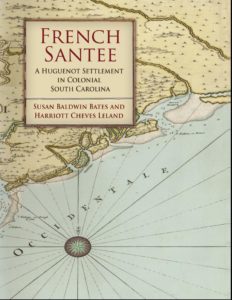French Santee, A Huguenot Settlement in Colonial South Carolina

French Santee, A Huguenot Settlement in Colonial South Carolina is an in-depth study of the 1687 Huguenot settlement on the Santee River in South Carolina with biographical sketches of the more than 100 French and Swiss Protestant families who lived there.
Fleeing terrible persecution in France, a large number of French left their homeland to eventually sail to the fledgling colony of (South) Carolina in the New World. The Lords Proprietors planned for the French to settle near the Scots at Port Royal south of Charles Town. An attack by the Spanish on Port Royal in the fall of 1686 caused the French to search for a new site and they journeyed north to the unexplored Santee River wilderness. As a letter writer chronicles, “We came upon this river to find a proper place not only for those French people already in the country who were not yet established, but also for those who could come and join us. We found what we were looking for, a place elevated upon a beautiful river, with a beautiful vista, fresh air, good waters, and the finest land in Carolina…” Here the refugees- mainly merchants, artisans and craftsmen– built a plantation society which thrived for over 150 years.
Signatures, seals and cattle brands of some of the earliest immigrants are reproduced in some of the sketches, as well as translations of early letters written from Carolina prior to 1700. The majority of the sketches include information about the immigrants and the first one or two generations in Carolina. The locations of their plantations and homesites in French Santee, which adds depth to understanding their lives, is discussed in the text and shown on the accompanying maps. These maps, photographs and copies of old plats show the changes in the area as the settlement grew and evolved into the eighteenth century. Thorough documentation and indexing mark this as a scholarly work, yet the captivating details and relationships of the families on the river will draw you into their stories, many of which begin with details of their lives in France.
The authors are once again delving into the earliest records of Carolina, the little used and sometimes undiscovered records of the Proprietary Period from 1670 to 1721. The book presents life on the frontier of Carolina during this period as revealed by the letters of the colonists and the records they left behind. Published in the spring of 2015 by Otter Bay Press, this book will appeal to avid genealogists, historians and ramblers of the South Carolina woods.
Click Here to View the Index Click Here to View the Slave Index
